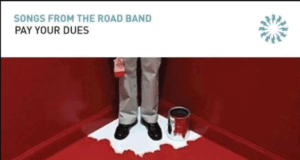“Bluegrass is, by nature, a collaborative form of music,” says Charles R Humphrey III, Songs From the Road Band’s bassist and bandleader. The band began as a part-time collective of western North Carolina musicians, but has grown, over the years, into a full-time touring band, with “community” remaining its driving force. This spirit of collaboration became especially important during the COVID-19 pandemic, through which Pay Your Dues, the band’s debut, was born.
 “Like all other musicians, we found ourselves with a lot of time on our hands,” says Charles. “We used much of that time writing and creating music with others.” The band later headed to Asheville’s famed Echo Mountain Recording and spent time laying down the tracks that would become Pay Your Dues. “During the pandemic, our music community became more important to us than ever, and we wanted the album to reflect that.” Recording during the pandemic did pose some challenges, and the release has been a long time in the making. With the exception of the album’s lone cover (a fan-favorite ‘grassed-up version of Elvis’ “Suspicious Minds”), all the tracks on the album are co-writes between Charles and other writers.
“Like all other musicians, we found ourselves with a lot of time on our hands,” says Charles. “We used much of that time writing and creating music with others.” The band later headed to Asheville’s famed Echo Mountain Recording and spent time laying down the tracks that would become Pay Your Dues. “During the pandemic, our music community became more important to us than ever, and we wanted the album to reflect that.” Recording during the pandemic did pose some challenges, and the release has been a long time in the making. With the exception of the album’s lone cover (a fan-favorite ‘grassed-up version of Elvis’ “Suspicious Minds”), all the tracks on the album are co-writes between Charles and other writers.
“I’ve been accused—it’s not a bad thing—of being a ‘frying pan writer’ as opposed to a ‘crockpot writer,’” Charles says, when asked about his process. Considering the 140-plus songs that the band culled to generate the album, he describes it further: “When I write, I make an appointment, and I cowrite. I like to start from scratch. I tell people don’t show up with too much, because we don’t want to change anything and hurt anybody’s feelings. It’s very rare that it takes longer than two hours. We’ll do a little work tape and have our lyrics and that song’s done. Then it’s just a matter of finding a home for it.”
The band is looking forward to extensive touring to expose their music to a wider audience. Charles is also making a little time for one of his other passions: fly fishing. “It’s not coincidence that the tour ends up in Idaho and Montana, where the fly fishing is excellent.”
To find out more, visit here. Click here to listen to the interview.
By Dan Walsh
 Americana Music Magazine – Bluegrass, Roots, Folk, Blues, and Old-Time
Americana Music Magazine – Bluegrass, Roots, Folk, Blues, and Old-Time